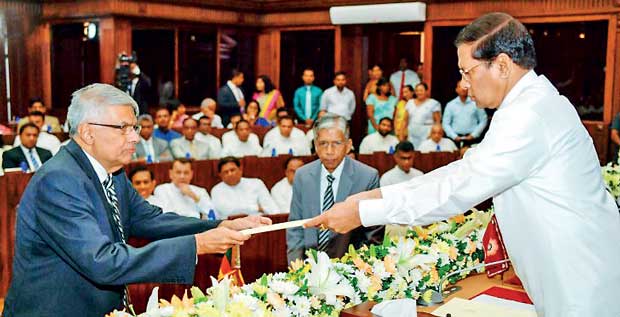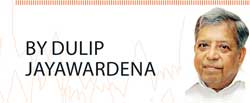Reply To:
Name - Reply Comment

 The Local Government elections held on February 10, 2018 was to elect 8,293 members to 341 local authorities (24 municipalities, 41 urban councils and 276 divisional councils – Pradeshiya Sabas). This is the largest election held so far in Sri Lanka in one day where 15.8 million voters were eligible to cast their votes under a mixed system where 60 percent of members will be elected using the first –past –the –post voting and 40 percent through the closed list proportional system.
The Local Government elections held on February 10, 2018 was to elect 8,293 members to 341 local authorities (24 municipalities, 41 urban councils and 276 divisional councils – Pradeshiya Sabas). This is the largest election held so far in Sri Lanka in one day where 15.8 million voters were eligible to cast their votes under a mixed system where 60 percent of members will be elected using the first –past –the –post voting and 40 percent through the closed list proportional system.
The election results clearly indicated that a relatively new political party called the Sri Lanka Podujana Peramuna (SLPP), the de-facto leader of which is the former president, swept the board winning almost 90 percent of the Pradeshiya Sabas (PS) and a sizable proportion of municipalities as well as urban councils.
Many theories have been put forward as to why the present Yahapalanaya government should or should not continue until its term expires in 2020.
A valiant attempt was made by the UPFA and SLFP to form its own government by dropping the UNP first by removing the prime minister and appointing a new prime minister by the president. It appears that legally the present prime minister cannot be removed unless a vote of no-confidence with two-thirds majority is brought against him in parliament. The SLPP gave its conditional support in removing the prime minister and exploring the possibility of appointing someone else from the SLFP/UPFA.
At present, the government machinery is at limbo with decision makers including high officials unable to take any decisions as the new cabinet has not been finalised.
As a layman, I thought of analysing the reasons for the people at grass root levels to lose confidence in the Yahapalanaya and voted the SLPP to the local government bodies with an overwhelming majority.
However, by changing the pack will not satisfy the common man unless drastic changes are taken immediately to bring down the cost of living and providing the other essential amenities such as an efficient health service, education, roads bridges and public transport facilities to the villager who have spoken univocally against this government at the election concluded on February 10, 2018.
Record of Yahapalanaya government
The victory of January 8, 2015 of the present unity government was mainly due to their pledge to punish politicians who were involved in massive frauds, misuse of power and other unethical practices that had and continue to have a direct impact of the poor masses of the country. However, the common voter realized that this pledge of the government did not materialize even after three and a half years.
In addition, the corruption continued in many spheres as reported in the print and electronic media. According to the media, the biggest scam in the history of Sri Lanka perpetrated on the poor masses was the Central Bank bond scam, where fingers are pointed at the members of the UNP, resulting in the resignation of one minister. There was also the resignation of another minister who was accused of shielding the members of the previous government without expeditiously taking legal action against frauds, etc.
Further, the UNP is also accused of holding key government ministries such as finance, economic development, etc. and failure to not deliver promises for three and a half years. Further, the government showed their failure in regional development especially at the village level.
Priority was given to infrastructure development such as roads, bridges covering major cities but with complete disregard to the requirements of the village. Schools were not properly equipped without looking into bare necessities such as buildings, desks and chairs and also filling up vacancies in rural village schools. Priorities were to give electronic tabs and create Wi-Fi zones.
Another factor why the government became unpopular was the SAITAM issue. University students demonstrated on the roads with the backing of a political party as well as the GMOA, which resorted to strike action.
Another serious issue which made the farmer turn tables on the government was the lack of fertilizer at the correct time and the breakdown of a proper and efficient distribution system.
The government was trying to attract foreign investment by giving tax holidays, etc. The new port in Hambantota was leased out to the Chinese on a public-private partnership (PPP) basis and attempts are now made to have a similar arrangement with India for the new airport constructed by the Chinese in the same area. Since both these projects were not viable, the attempts of the government were to build an industrial zone around the port and promote tourism by leasing the airport.
However, the common worker was not happy as excess labour recruited on a temporary basis were laid off and also gave the impression to the country that local assets are being sold to foreigners although the same modus operandi or complete ownership such as the Port City was adopted by the previous government.
Way forward for present government
The present government has another two years or less to show results and win the confidence of the voter from rural areas if it plans to come back to power.
To achieve such a major turnaround attention should be paid to improving the living conditions of the poor both in the village and the major cities. It is best to shelve grandiose projects such as mega cities, large industrial zones and allocate more funds for improving rural schools easing congestion in city schools as well as providing school uniforms without any coupons and try to cut red tape and corruption.
It is of paramount importance that village hospitals should be improved by providing adequate doctors, buildings, beds and other facilities. Drugs should be available to the poor at reasonable prices even after being heavily subsidized.
One of the main reasons why the present government got such a dubbing at the recent elections was due to the fact that the farmer was completely neglected by not providing adequate fertilizer and efficient distribution system. The Fertilizer Corporation of the past did a very efficient job in import and distribution of fertilizer. The National Fertilizer Secretariat, which is now defunct, met regularly and coordinated all such activities.
Another major reason why both the present and the previous governments failed miserably to look into need of the common voter was the interference of ministers and MPs in appointments, transfers and promotions of government servants. It is important that politicians should not interfere into the administration of government ministries, departments and other statutory institutions and the Public Service Commission should be strengthened by appointment of experienced and efficient officials who will act impartially.
Leadership of political parties
The main grouse of the common voter in Sri Lanka is that leaders of political parties have not named their successors and tend to remain in power indefinitely. This has caused the young politicians to be demoralized .I strongly suggest the each political party should adopt a policy to rotate their leadership so that young politicians will be groomed to lead and be honest and serve the people.
It is also important that politicians should lead simple lives without travelling in high-powered cars and go about in simple and economical cars. A good example is India, where the prime minister travels about in a local manufactured utility car.
Conclusions
I have tried to analyse the present political impasse and how the present government should build confidence of the voter especially from rural areas.
It had been reported that there will be another election in September this year for Provincial Councils followed by a general election.
The outcome of these two elections will determine the fate of the present government.
On the other hand, if there is a change of government before or after the people would like to hear from now what the opposition will do to improve the living strands of the people from the cities as well as rural areas. I am convinced that politicians in Sri Lanka are a selfish lot who will first think of themselves and neglect the people after they are voted in. Gentlemanly politics is now unheard in our country and may our politicians reform themselves and be servants of the people!
(Dulip Jayawardena, a Retired Economic Affairs Officer United Nations ESCAP, can be contacted at [email protected])